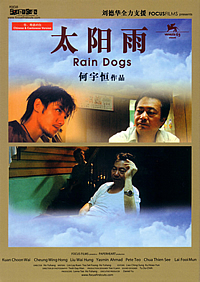SYNOPSIS:
When 19-year old Tung -- a young Malaysian living with his aging
mother in a town so small it seems little more than a wide spot
along a jungle-shrouded road to somewhere else -- sets out to
reconnect with his elder brother in the urban chaos of Kuala
Lumpur, little does he realize that a journey of self-discovery
into the conflicted realms of love, loyalty and loss lies directly
up ahead. Guileless and overconfident, young Tung soon finds
himself drawn ever-deeper into a world where deceit, treachery,
sudden violence, and irrevocable loss are the only certainties
-- and where the only lesson to be gleaned from his sudden coming
of age is just how difficult adulthood can make it for any of
us to ever go home again.
MOVIE REVIEW:
What
a shame: despite being strongly supported by Andy Lau, Focus
First Cuts did not really take off here. The project which
involved Asian filmmakers to produce feature films shot in
High Definition was launched last year to discover and nurture
new talents in the industry.
Alas,
the initiative met mixed reactions with arthouse pictures
like Kelvin Tong’s Love Story and Robin Lee’s
The Shoe Fairy. And now we have Malysian director Ho Yuhang’s
contribution, which was on limited run on the big screens
earlier this year.
Sure,
like the other films, this one may not be your more entertaining
mainstream movie, but it does get extra points for sincerity.
In one summarized line, the 92-minute movie tells a simple
story of a Malaysian teenager who takes a journey and realizes
what growing up is all about.
The plot
may not sound too exciting, but there is something about seeing
familiar objects like the ringgit dollar, the old-school scooter
and the rustic buildings and basketball courts on screen which
make us feel nostalgic all over. What’s more, you get
to hear some heavily-accented Malaysian Mandarin spoken by
the characters. That definitely helps us Singaporeans connect
to the film more.
What may
turn the ordinary viewers off has to be the “Hou Hsiao-hsien
pace” of things. The extremely long takes, the limited
close-up shots, the minimal dialogue and music underscore
– these may not be everyone’s cup of tea.
A check
with the credits indicates that the film editor is Liao Ching-Song,
who has served on many of Hou’s works including Flowers
of Shanghai (1998), Café Lumiere (2003) and Three Times
(2005).
It’s
no wonder why we are left with tons of time to contemplate
about the shot composition, feeling distanced from the protagonists
and appreciating the pleasing palette of colours used for
the shots.
That
isn’t a bad thing - if only more people would give films
like this a chance.
MOVIE
RATING:
   
Review
by John Li
|


